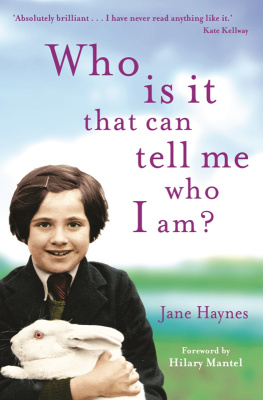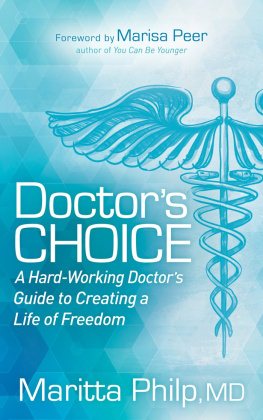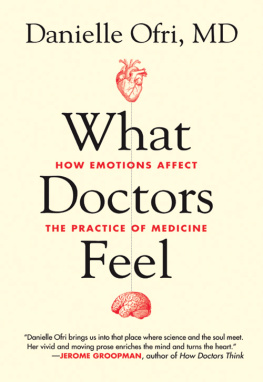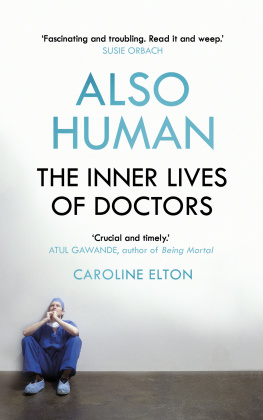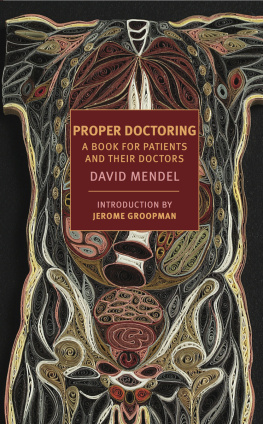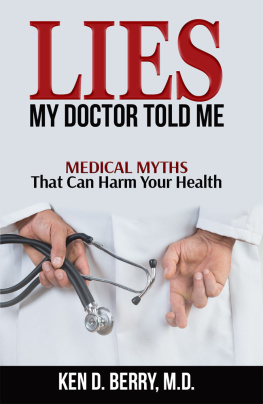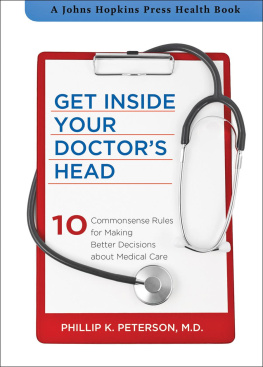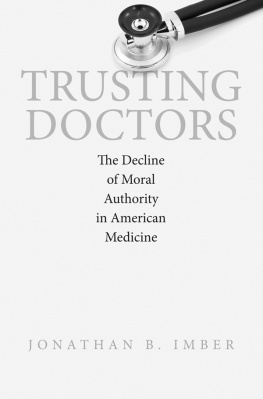First published in 2015 by Quartet Books Limited
A member of the Namara Group
27 Goodge Street, London W1T 2LD
Copyright Jane Haynes and Martin Scurr 2015
The right of Jane Haynes and Martin Scurr to be identified
as the authors of this work has been asserted
by them in accordance with the
Copyright, Designs and Patents Act, 1988
All rights reserved.
No part of this book may be reproduced in
any form or by any means without prior
written permission from the publisher
A catalogue record for this book
is available from the British Library
ISBN 978 0 7043 7382 2
Typeset by Josh Bryson
It is illness that makes us recognize that we do not live in isolation but are chained to a being from a different realm, worlds apart from us, with no knowledge of us and by whom it is impossible to make ourselves understood: our body.
Introduction
Youre on earth. Theres no cure for that.
Samuel Beckett
This is a storybook about medicine, body, mind, doctors and caprices of human nature written by an experienced doctor in his sixties (Martin Scurr), who has seen every untidy vagary of disease, and a psychotherapist of similar age (Jane Haynes), who has listened to personal narratives that rival the visceral emotions of King Lear . Doctors at their most profound are mercurial messengers between life and death. At a more comedic level doctors, who must suffer our jiggling body parts, are also behind their white masks vulnerable and sometimes flawed men and women struggling to make sense of their existence. They are the only people other than our lovers to whom we (if unwillingly) grant voluntary access to our bodies and their orifices. The degree of such intimacy is emphasized by the concern of all medical ethics which promises that we will not be taken advantage of should we fall ill and become infantilized. Hippocrates wrote, First do no harm.
Our intentions are fourfold: first we wish to explore the ways in which the figure of the twentieth century General Practitioner, trained to have a holistic and humanistic approach to his patients health, often from birth to death, have been eroded. A revolution has occurred in the practice of general medicine in the UK, which has been effected through changes in successive government policies and the needs of a changing demography.
Secondly, we consider whether the idea of a family doctor, who was familiar with the names and medical histories of patients, has become a casualty of the NHS and a loss to the vocation of medicine. The increasing popularity of alternative and holistic medicines, which are more affordable than private medicine, is another indication that the public are disillusioned with the utility of their medical care and are seeking to complement it. More and more people are driven to compensate for the absence of time, the personal touch, or bedside manner, by seeking out a substitute in the form of a complementary practitioner who remembers them from one consultation to the next.
Thirdly, we will steal behind the mask, or professional persona, of the doctor to discover how the privileges, challenges and overbearing responsibilities of vocation impact upon private life. To these ends, in her role as psychotherapist, Jane has attempted an autopsy on Martins professional, and where the two inevitably merge, his personal life; in other words, his existence. We will discover how the medical profession has changed over 40 years primarily through a series of interviews with Martin who qualified in 1973, illumined by memoir, and later on with his son Cosmo, who is currently in postgraduate training to become a consultant in Anaesthetics. The accounts of Cosmos enthusiasm and passion for his vocation will allow the authors to avoid the pitfalls of a shared nostalgia in which the past can present itself as a golden age. Cosmos medical school training at Imperial College, London has been different from his fathers and whether it is improvement, impoverishment, or just different the reader must decide.
Last, but perhaps most important of all, we want to penetrate beyond the political issues into the heartlands of people who are drawn to a life in medicine; to explore through narrative what it means to choose a profession in which the practitioner is constantly being faced with lonely decisions that are often equivalent to life and death. To these ends we shall also interview other GPs both NHS and private, both young and retired, about their lives and masked selves. Our intention is not to provide quantitative research into the career structures of our contributors lives, but to explore the existential and emotional phenomena of choosing a career in medicine.
It is also clear from our interviewees that candidates for training come primarily although by no means exclusively from middle class families. Regardless of the familial and cultural origins of our contributors the choice of a medical career has rewarded all of them with financial, if not emotional security and a privileged position in society of authority and respect. The rewards and privileges of becoming a GP, whether in London, or Glasgow, whether driven by vocation or ambition, are undisputable and substantial, whereas the affluence or deprivation of their patients lives will vary hugely according to geography and to their choice of employment. Salaried NHS GPs, who are part of a clinical commissioning group, can earn between 54,319 to 81,969 dependent on, among other factors, length of service and experience, while practice partners earnings can reach 160,000. The same is not true of hospital doctors where even a senior specialist registrar will still only be earning in the region of 47,000 and the most senior full-time NHS consultant physician, or surgeon at the top the ladder is unlikely to earn more than 130,000, with the average being half that amount. As a point in comparison the Guardian stated: David Cameron and Ed Miliband will face embarrassment this week when it is announced that MPs will be paid an annual salary of 74,000 from 2015 despite their calls for cheaper politics.
Medicine is not just a job, a paid profession. Being a doctor means to become a member of a profession which historically has been put on a pedestal and is seen to be somehow different: respected, and even honoured, but also quickly reviled whenever it is found to be wanting. Ideally, its skill set demands a challenging combination of the objectivity of scientific professionalism with human warmth and sympathy which is difficult to predict in an 18-year-old applicant. The days of medical fathers proudly introducing their children to the deans of medical schools, offering them up for interview on the grounds that they show promise, play for a schools rugby team, or sing in the choir fortunately have come to an end but there is evidence that we still do not know how to select, out of the young people completing their secondary schooling, the best and most suitable candidates to train for a medical career.
Politically directed changes are annually taking place within the medical profession, which impact on the different ways that medical faculties are constructed and on the priorities of a medical training. Change is healthy and inevitable and it is also the backbone of science but there is increasing suspicion among the medical fraternity that such modifications are not always in either the best interest of patients, or the practice of medicine. These changes are best summed up in Dr Peter Holdens radio commentary on his official report on the 7/7 terrorist attacks. A bus was blown up outside of the British Medical Association headquarters where Holden, a specialist in trauma control, was by co-incidence attending a meeting.


